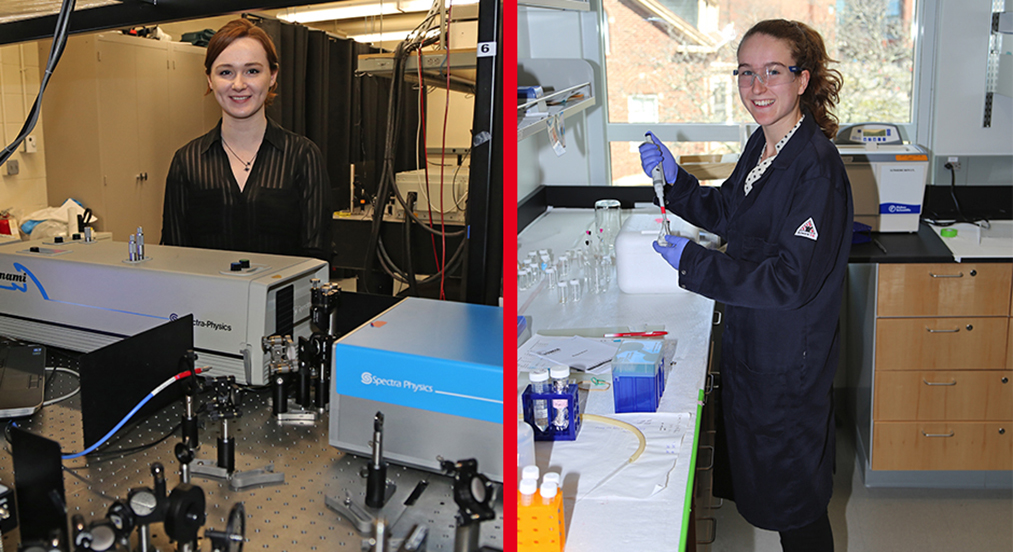
Brown School of Engineering's Amy Butcher '17, Sarah Cowles '17, and Ph.D. student Helena Liu have each won a three-year National Science Foundation (NSF) fellowship in the Graduate Research Fellowship Program. Recent engineering graduates Nikki Driscoll '16, Marielena Gamboa Castro '15, Cory Hargus '14, Mehrdad Kiani '15 and Jack Wilson '16 were also honored this year with awards.
The NSF GRFP helps ensure the vitality of the human resource base of science and engineering in the United States and reinforces its diversity. The program recognizes and supports outstanding graduate students in NSF-supported science, technology, engineering, and mathematics disciplines who are pursuing research-based masters and doctoral degrees at accredited United States institutions. NSF Fellows are anticipated to become knowledge experts who can contribute significantly to research, teaching, and innovations in science and engineering. These individuals are crucial to maintaining and advancing the nation's technological infrastructure and national security as well as contributing to the economic well-being of society at large.
Butcher's proposal to the NSF involves producing clean water by essentially speeding up the water cycle. Her project involves using the plasmonic response of aluminum nanoparticles to evaporate water with solar energy. Sunlight excites electrons in these nanoparticles, which then heat up enough to be able to evaporate surrounding water, separating it from salt and pollutants. Butcher proposes assembling core-shell aluminum nanoparticles (which have layers of different materials, like gobstoppers) into a porous aluminum structure which floats on water and serves to make the nanoparticles' photothermal response to sunlight more efficient. As a senior, she is currently working in Professor Dan Mittleman's lab, completing her senior thesis in engineering physics. Her thesis work involves combining laser terahertz emission microscopy with nano-optics in order to study semiconductors which emit terahertz radiation when excited with short optical pulses. Later this year, she will begin working toward her Ph.D. at the University of Chicago's Institute for Molecular Engineering, exploring light-matter interactions on the nanoscale.
Cowles, a chemical and biochemical engineering senior, is conducting research under the guidance of her thesis advisor Assistant Professor Anita Shukla, on the development of a novel antifungal liposomal delivery system. She is investigating the use of a peptide fragment from the Histatin 5 protein to target Candida albicans. C. albicans, an opportunistic fungi, can lead to systemic candidiasis infection with a high mortality rate of 33-54% and estimated treatment costs of two to four billion dollars each year. Targeted drug delivery systems limit unnecessary exposure to antimicrobials and still effectively treat virulent cells, therefore minimizing the development of drug resistance. As she heads to graduate school, Cowles plans to pursue research in drug delivery and biomaterials utilizing peptide engineering to improve cancer and infectious disease therapies.
Helena Liu, a second-year materials science Ph.D. student, is studying computational materials science under the guidance of Associate Professor Axel van de Walle. Liu's research interests include the calculation of thermochemical and structural data of refractory oxides at high temperatures.
Driscoll and Kiani are both currently studying bioengineering. Driscoll has continued her education at Penn, while Kiani is at Stanford. Gamboa Castro is studying biomedical engineering at Georgia Tech. Wilson is currently at Princeton, studying atomic, molecular and optical physics. Hargus is deciding on a school to continue his chemical engineering studies.
The GRFP provides a yearly stipend, along with a $12,000 cost of education allowance for tuition and fees (paid to the institution), opportunities for international research and professional development, and offers the honoree the freedom to conduct his/her own research at any accredited U.S. institution of graduate education he/she chooses.